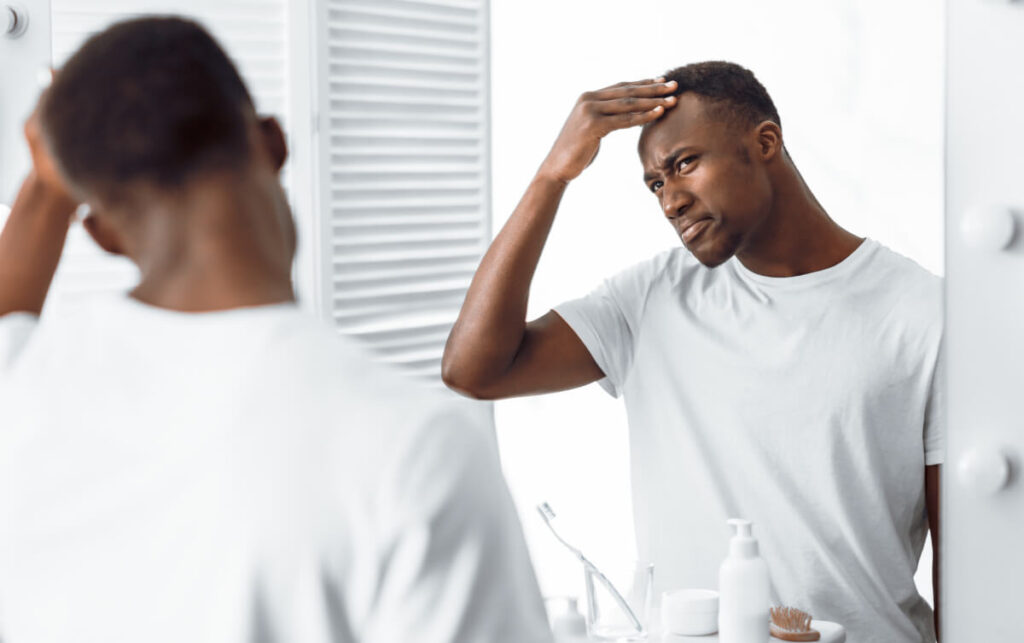No person is really immune to hair loss problems. At some point in life, men and women will experience thinning hair, receding hairline, and hair shedding concerns. It’s usually more of an age-related problem and it’s only a matter of time until they start seeing strands of hair falling out. But it’s also possible that male pattern hair loss and female pattern hair loss can be associated with changing hormones, particularly the presence of testosterone.
So why does testosterone cause hair loss? Testosterone is the primary androgen or male hormone and both men and women have it in their bodies. It exists in different forms and one of its byproducts is the dihydrotestosterone DHT hormone. High amounts of DHT levels can cause the size of the hair follicle to shrink, leading to reduced hair growth and eventual hair loss.
What’s the Role of Testosterone in Hair Growth in Men and Women?
Sex hormones are unique to males and females but its functions for individuals are the same. In general, specific hormones are responsible for the development of masculine and feminine traits and characteristics, sexual function and reproduction, and helps maintain overall good physical health and wellbeing.
When it comes to issues concerning hair growth and hair health, the testosterone hormone is the one that’s always in the spotlight. In males, testosterone is responsible for their development during puberty and an adequate amount of testosterone is needed for them to increase muscle mass and grow facial and body hair.
For women, testosterone is released in small amounts from the ovaries and the adrenal gland. While they’re not as affected by low testosterone, women may also struggle with androgenetic alopecia due to high DHT levels converted from high levels of androgen. Female hair loss can also be associated with hormone changes during pregnancy, medications, menopause, and thyroid hormone imbalance.
Understanding DHT and How It Triggers Hair Loss

To better understand why and how testosterone causes hair loss, you have to understand that this hormone can exist in different forms in the body. The most common types of testosterone are:
- Free testosterone (free T) – this refers to androgen hormones that are not linked to any proteins in the body. Most of the testosterone that’s abundant in the system binds itself to proteins to carry out their function. There’s normally a small percentage of testosterone that doesn’t attach itself to any receptor.
- Bound testosterone – this amounts to the majority testosterone levels that an individual has and it’s typically attached to either albumin or sex hormone binding globulin (SBHG)
- Dihydrotestosterone (DHT) – DHT hormones are created through the conversion of testosterone in the body. It’s a derivative of the androgen made by the enzyme known as 5-alpha reductase and it’s said to have stronger effects than testosterone itself.
The role of DHT in hair growth is that it shrinks the hair follicles. When this happens, the normal hair growth cycle is completely interrupted and can trigger early signs of male hair loss and female hair loss. DHT affects the hair growth cycle by:
- Anagen phase – this is the growth phase where the hair follicles are actively growing new hair. DHT can attach to the receptors in the hair follicles which can shorten the amount of time in which the hair remains in this growth stage.
- Catagen phase – this is the transition phase when the hair follicles shrink and hair growth slows down. In essence, the follicles stop producing new hair to allow the strands to separate from the bottom of the follicles. The presence of DHT affects the catagen phase in terms of turning the follicles smaller so it would be harder for the new anagen phase to start.
- Telogen phase – this is the resting phase of the hair growth cycle and the follicles remain inactive for several months. Some hair strands may be pushed out of the follicle during this phase and the activity of DHT could cause this stage to last longer and make it easier for existing hair to shed. Some individuals could experience telogen effluvium, a condition of excessive hair shedding or hair thinning that could possibly be caused by stress or traumatic events.
Male pattern baldness and hair thinning from testosterone activity can be caused by different factors. For one, people on testosterone replacement therapy may experience hair loss as a side effect of the hormone treatment. Receiving testosterone supplements and testosterone injections for low T may subsequently increase DHT which could lead to temporary hair loss symptoms. However, once the hormone levels return to a balanced state, there’s a chance that the symptoms could improve.
In women who have normal levels of testosterone, the cause for their hair loss may be that their follicles are highly sensitive to DHT. This means that even small levels of testosterone and DHT hormones can easily affect the size of their follicle and scalp hair, leading to poor hair growth and hair health. Compared to males who experience receding hairlines, females with androgenic alopecia begin losing hair volume and thickness and they may see patches of thinning hair on their scalp.
Supplements That Can Help Hair Loss Caused by Testosterone Changes

One of the best ways to combat hair loss from hormone changes is through prescription medications and supplements. Most hair loss products and hormone supplements are designed to lower the production of androgen while at the same supplying vitamins and nutrients needed to stimulate healthy hair regrowth.
Here are some of the common medications suggested for hair loss:
1. DHT blockers
DHT blockers or anti-androgen medications are a solution to stopping the activity of DHT and testosterone. They essentially work to inhibit DHT from latching onto the receptors, particularly those in the hair follicles that may cause them to shrink in size. Some of the known hair loss medications with DHT blocking effects are finasteride and dutasteride.
Women with hair loss can also benefit from anti-androgen drugs such as spironolactone. As a hair loss treatment, this prescription medication helps reduce testosterone levels to minimize the amount of DHT that could be created in the scalp.
Minoxidil is another effective DHT blocker that could help stimulate hair regeneration. As an oral supplement, minoxidil helps enlarge blood vessels to deliver more nutrients and oxygen to the follicles which can encourage hair growth. Minoxidil can also be used topically by applying it directly to the follicles and the scalp for better hair growth effects.
2. Biotin supplements
Biotin is a natural vitamin that’s needed to boost keratin production in hair and maintain scalp health for increased follicle activity. It also helps strengthen the quality of hair to prevent hair loss and patches of bald spots. Biotin can be taken from oral dietary supplementation or from natural food sources like egg yolks, whole grains, nuts, fish, and meat.
3. Vitamin B supplements
Taking supplements for vitamins B6 and B12 is also beneficial for overall hair and scalp health. They’re believed to help boost blood flow to the follicles which encourages healthy hair growth and they can improve thinning hair issues by growing fuller and thicker strands from the follicles.
4. Pumpkin seed oil extract
Pumpkin seed oil is a natural herb remedy for hair loss and it’s believed to have DHT blocking properties. Taking pumpkin seed oil as a supplement for hair care can potentially minimize hair thinning and promote hair growth.
5. Saw palmetto
Another natural supplement that’s said to work for hair loss is saw palmetto. It can work by blocking the enzyme that produces DHT to help maintain healthy and active hair follicles. This supplement is beneficial for maintaining hormone balance to prevent hair loss.
Are DHT Blockers and Supplements Safe?
These medications should only be taken upon doctor’s prescription to ensure safety of use. Some DHT blockers for treating hair loss may have potential side effects such as acne, rashes, breast tenderness, vomiting, and headaches. In male patients, DHT blockers may cause erectile dysfunction, lower sex drive, and darkening or thickening of hair.
Other Treatment Options to Promote Hair Growth

Supplements are generally recommended to ensure a patient is getting enough nutrients to sustain their overall wellbeing and hair health. In serious cases of hair loss symptoms, specialized hair loss treatments may be used to encourage hair growth:
- Hair transplant – It’s a hair replacement procedure that involves taking hair from a donor area in the scalp and transplanting it to the bald spots. It’s effective for covering patches of thinning hair and provides natural-looking hair growth results.
- Laser treatment – Low-level laser therapy can be used to stimulate cells in the hair tissues and encourage new hair regrowth. It’s a minimally invasive procedure for hair loss with fewer reported adverse effects when done by a cosmetic professional.
- Microneedling – It’s a cosmetic treatment that uses a device with tiny needles to create controlled micro injuries to the scalp. This will trigger the healing response of the skin and induce collagen production to repair hair follicles and stimulate hair growth.
- Topical serums – Doctors can also recommend topical serum products with specialized hair care formula for the management of hair loss. A popular hair care serum is the PEP Factor product which contains peptides, nutrients, and growth factors that are said to help cell growth to maintain hair follicles to rejuvenate healthy hair. PEP Factor products can also be used to improve certain skin conditions such as acne breakouts.
Buy Hair Rejuvenation Supplies and Tools at FACE Med Store
Hormonal imbalance is one of the known causes of hair loss and pattern baldness in men and women. While supplements and DHT blockers can manage this condition, hair loss that’s caused by other factors may better respond with specific treatment methods for hair regrowth.
At FACE Med Store, we specialize in providing high-quality medical tools and supplies at affordable prices. We are proud to be trusted partners of many cosmetic clinics and practices, helping them provide exceptional aesthetic treatments and growing their clientele. Browse our website to see more of our offers or contact us and talk to our specialists to know how you can get the best skin and hair rejuvenation products.
Learn More: How to Get Rid of Women’s Facial Hair Permanently With Supplements






